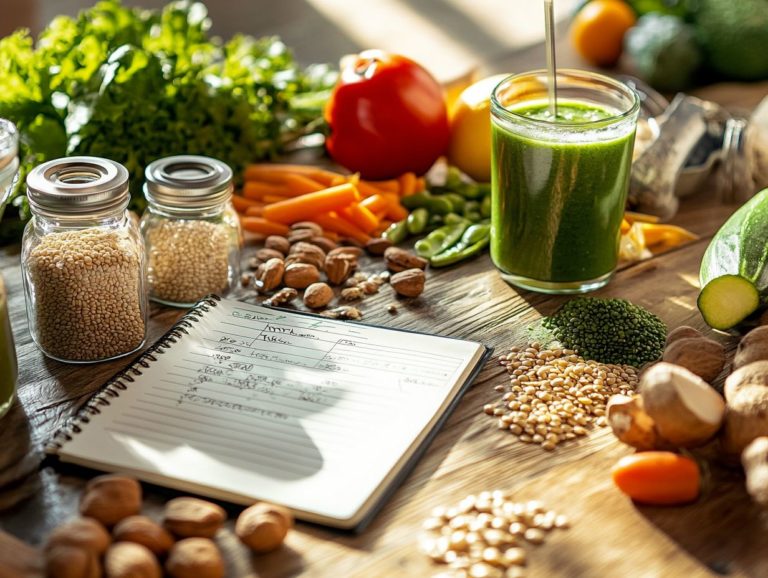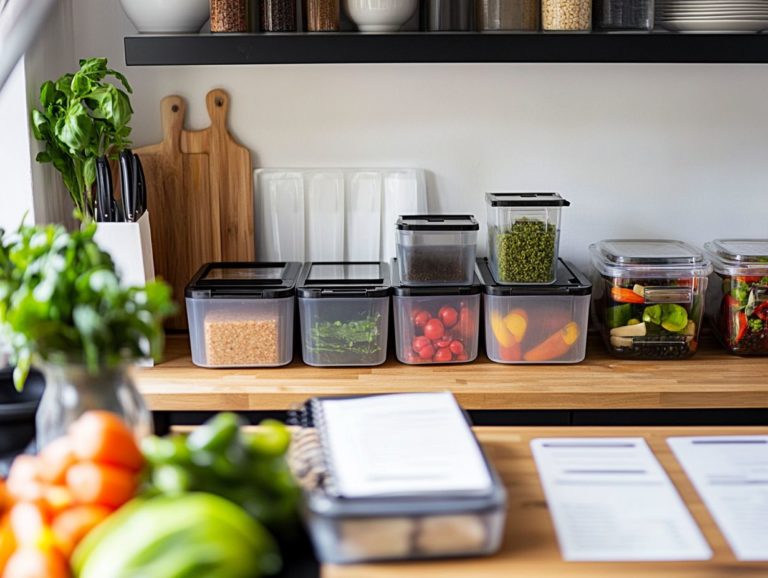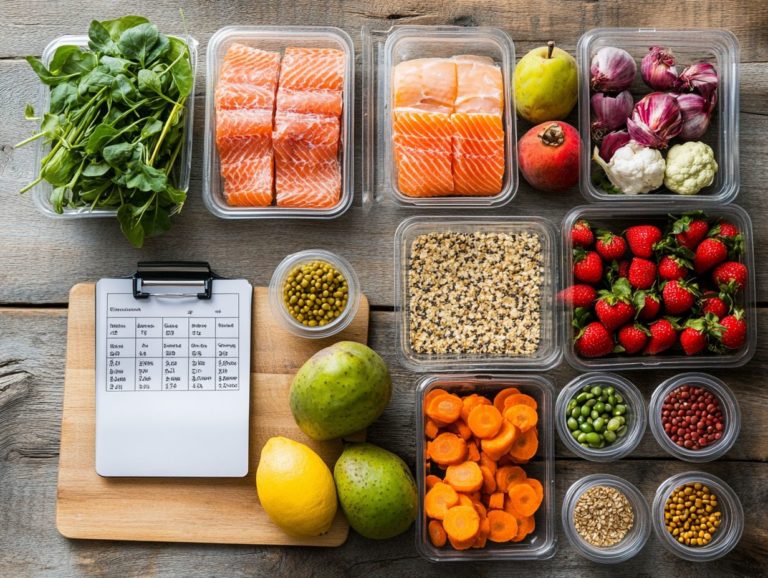5 Strategies for Last-Minute Meal Planning
In your fast-paced life, meal planning can often feel overwhelming, particularly when time is limited. However, with a touch of creativity and a dash of organization, you can whip up delicious and nutritious meals without the stress.
This article delves into five effective strategies for last-minute meal planning. From assessing what you already have in your pantry to leveraging online tools, discover how to make the process simpler.
Get ready to transform how you cook! You ll save both time and money while keeping your meals exciting and healthy.
Contents
Key Takeaways:
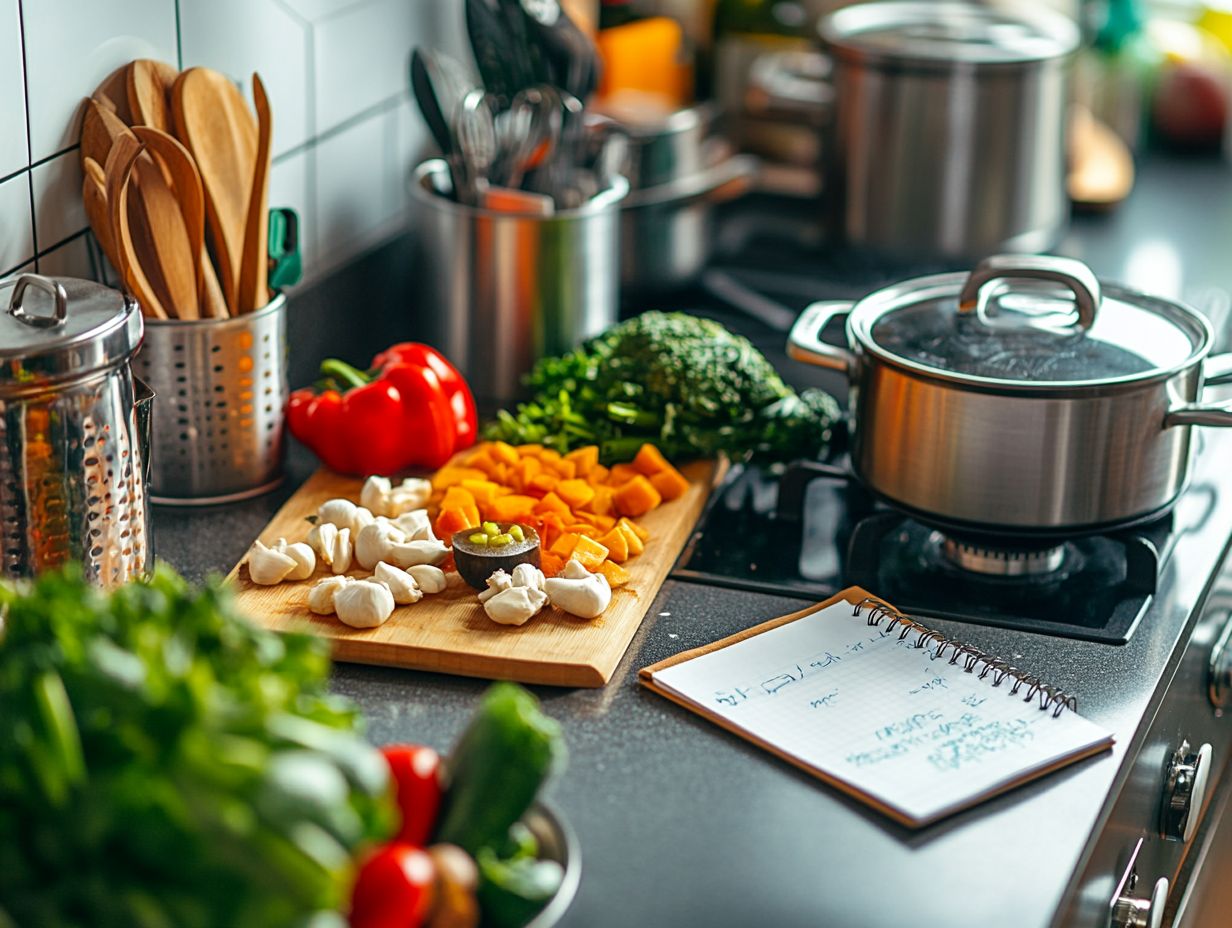
- Take inventory of your pantry and fridge to assess available ingredients.
- Plan meals around what you already have to save time and money.
- Utilize leftovers creatively to reduce food waste and save on ingredients.
1. Take Inventory of Your Pantry and Fridge
Taking inventory of your pantry and fridge is an essential first step in effective meal planning. This allows you to assess the ingredients you already have and identify seasonal produce.
By knowing what s available, you minimize grocery shopping, reduce food waste, and ensure nothing goes to waste all while enhancing your cooking methods.
To systematically check your items, start by emptying the shelves and drawers. Group similar items together canned goods in one section, grains in another, and perishables in a clearly defined area.
As you sort through these ingredients, take note of perishables nearing their expiration dates and prioritize their use in your upcoming meals. Adopting effective food storage techniques, including labeling and optimal placement for frequently used items, will extend freshness and create an inviting workspace.
An organized kitchen is the backbone of efficient cooking, making it easier for you to whip up nutritious meals, even on a busy schedule.
2. Plan Meals Around What You Already Have
Planning your meals around what you already have is a savvy move. It saves time and money while sparking creativity in your kitchen.
By taking stock of your pantry staples and fresh produce, you can brainstorm a variety of meal ideas that cater to your personal tastes. Consider trying out different cooking techniques grilling, roasting, or stir-frying to transform simple ingredients into gourmet delights.
Themed nights, like taco night or a customizable salad bar, can inject fun into your routine, turning ordinary dinners into exciting culinary adventures.
Modifying existing recipes to incorporate what you have on hand can lead to delightful surprises. Think about swapping quinoa for rice or adding unexpected spices to elevate a basic sauce. With a dash of imagination, every meal can become a delicious and budget-friendly experience.
3. Utilize Leftovers
Utilizing leftovers can significantly streamline your meal prep. This not only establishes a sustainable leftovers routine but also maximizes the value of your ingredients while minimizing waste.
For example, think about incorporating rotisserie chicken into salads or wraps. It adds variety to your menu without demanding excessive cooking time. To keep those leftovers fresh and flavorful, store them in containers that seal tightly to keep food fresh.
By planning ahead and batch cooking grains or vegetables, you can save precious time on hectic weeknights. Embracing these strategies promotes efficiency in your kitchen and sparks creativity in refreshing your mealtime options.
Start planning your meals today!
4. Keep It Simple
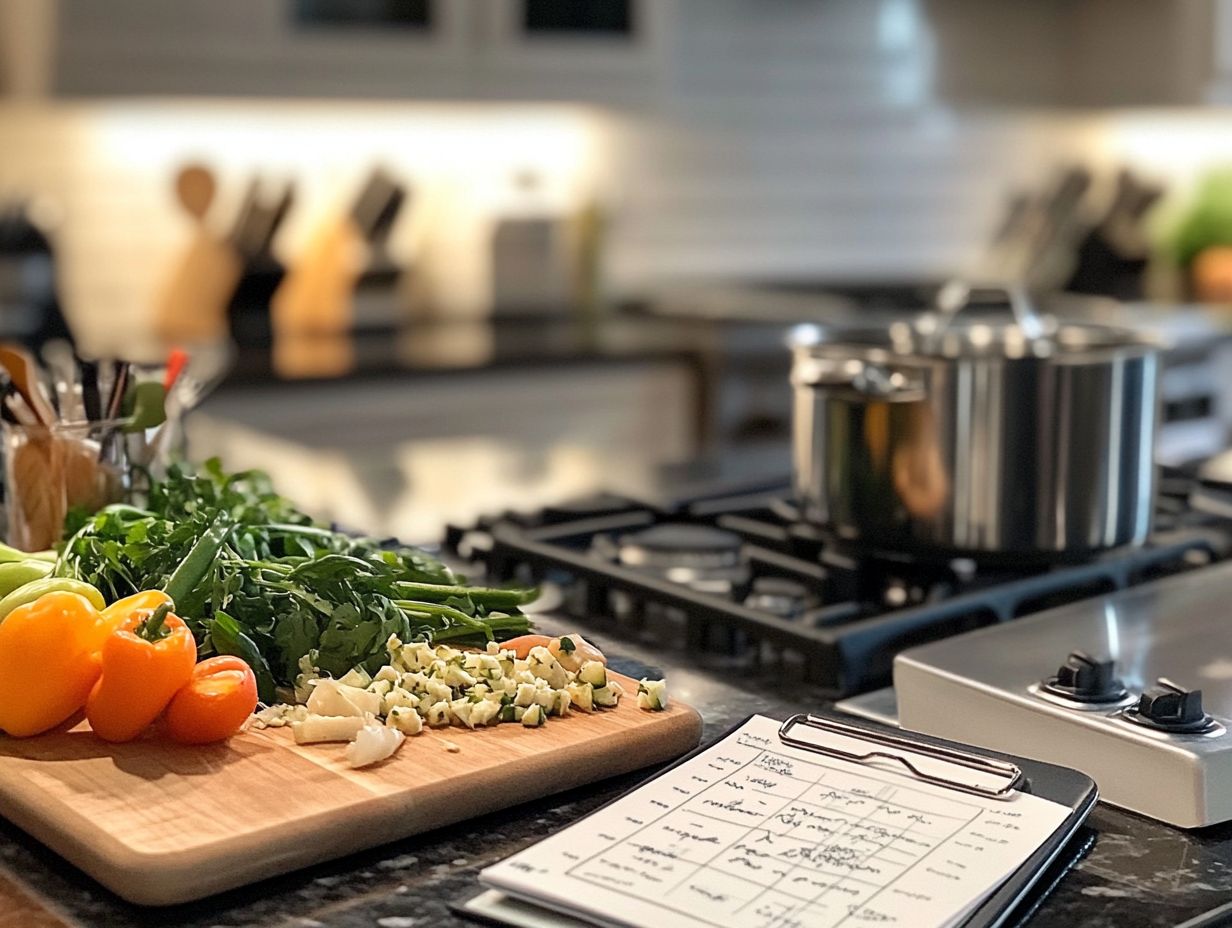
Keeping meal planning simple is key to reducing stress during your busy work week. Easy recipes and straightforward cooking tips can lead to quick dinners that satisfy the whole family.
By focusing on simple ingredients and fewer components, you can transform mealtime into a relaxing experience instead of a chaotic race against the clock. Utilizing convenient cooking methods like the Instant Pot can significantly cut down on preparation time and allow you to create a range of delicious meals with minimal effort.
For instance, consider whipping up:
- One-pot chili
- Creamy risottos
- Hearty vegetable stews
These dishes not only taste fantastic but also require little more than chopping and stirring. By embracing this approach, you can enjoy wholesome dinners without the hassle, leaving you more time to savor the moments with your loved ones.
5. Use Online Meal Planning Tools
Harnessing online meal planning tools can truly transform your grocery shopping and meal prep experience, offering you a streamlined approach to organize your kitchen and plan your meals effectively.
These tools simplify the planning stage and enhance your cooking experience. Platforms like Pinterest are a treasure trove of creative meal ideas, allowing you to explore a variety of cuisines and cooking techniques. Meanwhile, Epicurious stands out as a reliable source for well-curated recipes.
By browsing through these platforms, you can effortlessly compile grocery lists tailored to your chosen dishes, eliminating the guesswork during your shopping trips. Online tools save you valuable time and help maintain an organized kitchen, making cooking a more enjoyable and efficient endeavor.
What Are the Benefits of Last-Minute Meal Planning?
Last-minute meal planning offers exciting benefits, allowing you to quickly whip up spontaneous, healthy dishes when time is tight. It also enhances your cooking techniques and alleviates the dinner dilemma that often plagues busy workweeks.
This method fosters efficiency. It also sparks creativity as you discover how to make the most of the ingredients at hand.
Chefs like Alaina Chou and Gigi Wong epitomize the art of last-minute cooking. They skillfully transform leftover produce and pantry staples into delightful meals that both surprise and satisfy.
For example, Chou has an extraordinary talent for blending random vegetables with bold spices, turning a simple stir-fry into a culinary masterpiece. Meanwhile, Wong’s focus on quick, flavorful sauces can elevate even the most mundane ingredients to new heights. By embracing these practices, you ll not only reduce food waste but also discover the thrill of trusting your instincts in the kitchen!
How Can Meal Planning Save Time and Money?
Effective meal planning is your secret weapon for saving both time and money. It helps you streamline grocery shopping while employing budget-friendly strategies that cut down on unnecessary expenses.
By mapping out a weekly or monthly menu, you can craft precise grocery lists that align perfectly with the meals you plan to prepare. This focused approach tames the chaos that often accompanies last-minute shopping trips and dramatically reduces those tempting impulse buys that can derail your budget.
Expert Joe Sevier puts it succinctly: “When you know what you need for the week ahead, you eliminate the guesswork, making it easier to stick to your budget.” By organizing your meals in advance, you not only pave the way for healthier eating habits but also optimize your financial resources, ultimately enhancing your family’s overall well-being.
What Are Some Quick and Easy Meal Ideas?

Quick and easy meal ideas are essential for busy families like yours. They offer a variety of options that use minimal meal components and require straightforward cooking tips to prepare delicious and healthy meals in no time.
When planning a weeknight dinner, being flexible is your best friend. For example, stir-fried vegetables paired with protein can be customized with any seasonal produce or leftover meats. This gives you a fresh twist every time.
You might consider using chicken, tofu, or chickpeas. Switch out the usual rice for quinoa or cauliflower rice to keep things interesting. M.H. s recipes often suggest quick marinades that can elevate even the simplest grilled fish or roasted veggies.
Embracing one-pan meals not only simplifies cleanup but also allows you to experiment with flavors by mixing various spices and sauces. These adaptable approaches ensure that you can whip up a satisfying dinner, no matter how hectic your schedule may be.
How Can One Incorporate Healthy Options into Last-Minute Meal Planning?
Incorporating healthy options into your last-minute meal planning is entirely within reach. Focus on seasonal produce and learn simple cooking techniques that enhance nutrition without compromising on taste or convenience.
Choosing seasonal ingredients ensures you re getting peak flavor while supporting local agriculture. This also helps minimize your environmental impact, making your meal-prepping process more sustainable.
Techniques like steaming and quick saut ing help lock in essential vitamins and minerals. This ensures that every bite remains both nutritious and satisfying.
When searching for inspiration, insights from experts like Kate Kassin emphasize the beauty of minimal cooking methods that let vibrant veggies take center stage. By prioritizing fresh options and employing efficient cooking strategies, you can effortlessly whip up delightful meals that are quick, healthful, and transform everyday ingredients into nourishing feasts.
What Are Some Tips for Sticking to a Last-Minute Meal Plan?
Sticking to a last-minute meal plan demands discipline and effective cooking strategies. Here are some practical tips for organizing your kitchen and implementing efficient food storage techniques.
To keep your meal planning flexible while minimizing waste, create a list of versatile staples that can be easily combined in various ways. For example, incorporating seasonal produce boosts your meal variety and adapts effortlessly to changing grocery availability.
Jesse Szewczk recommends an organized system where you prep meals in advance, yet retain the flexibility to pivot based on the ingredients you have on hand.
Use clear storage containers and label them with dates. This keeps your food fresh and helps reduce last-minute cooking stress.
What Are Common Mistakes to Avoid When Last-Minute Meal Planning?
When diving into last-minute meal planning, it s essential to sidestep common pitfalls that can lead to stress and wasted ingredients. This ensures a more successful and enjoyable cooking experience.
Many people often overlook the significance of preparation, which can result in hasty decisions and a chaotic kitchen atmosphere. It s easy to misjudge cooking times, leading to frustration and hunger.
Neglecting to utilize the ingredients you already have on hand may force you into unnecessary grocery runs. This contributes to food waste. Gigi Wong highlights the importance of assessing your pantry and fridge, allowing you to plan meals around what s available.
Consider jotting down a flexible list of dishes that can be crafted with those ingredients. This approach facilitates smoother execution and reduces anxiety during the cooking process.
Frequently Asked Questions

Start your meal planning journey today and enjoy stress-free cooking!
What are the 5 strategies for last-minute meal planning?
Here are five effective strategies for last-minute meal planning: using leftovers, having a go-to pantry meal, planning with versatile ingredients, utilizing freezer meals, and referring to these 5 tips for planning balanced meals to create meal templates.
How can using leftovers help with meal planning?
Leftovers let you transform previous meals into new dishes. You can even freeze them for future use, saving time later!
What is a go-to pantry meal?
A go-to pantry meal is a simple recipe made from staples you always keep on hand. It s your time-saver when you need to cook quickly.
What are versatile ingredients?
Versatile ingredients can be used in many different recipes. They offer flexibility in your meal planning, making it easy to whip up last-minute dishes.
How can freezer meals help?
Freezer meals are convenient, pre-prepared dishes that can be easily reheated. They are perfect for those hectic days when you need a quick meal.
What are meal templates?
Meal templates provide a simple framework for planning meals. They can be customized to suit your preferences and dietary needs, making last-minute planning a breeze.

